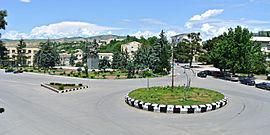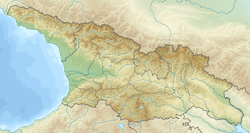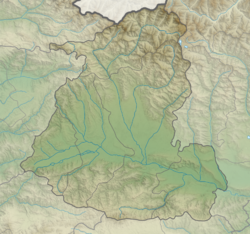Kaspi facts for kids
Quick facts for kids
Kaspi
კასპი
|
|
|---|---|
|
Town
|
|

panorama of Kaspi
|
|
| Country | |
| Region | Shida Kartli |
| District | Kaspi |
| Town from | 1959 |
| Highest elevation | 700 m (2,300 ft) |
| Lowest elevation | 560 m (1,840 ft) |
| Population
(January 1, 2024)
|
|
| • Total | 12,415 |
| Time zone | UTC+4 (Georgian Time) |
| Area code(s) | +995 371 |
| Website | http://www.kaspi.org.ge |
Kaspi (Georgian: კასპი) is a town in central Georgia. It is located on the Mtkvari River. Kaspi is the main town of the Kaspi district. This district is one of four in the Shida Kartli region.
The town was first settled a very long time ago, in the Middle Ages. In the 15th century, a powerful noble family called the Amilakhvari owned the town. Kaspi officially became a town in 1959. As of January 2023, about 12,708 people lived there.
Kaspi is home to a large cement factory. This factory is one of the biggest in Georgia. It helps make building materials for many projects.
Contents
History of Kaspi
Kaspi is one of the oldest towns in Georgia. People first wrote about it in the 4th century. Back then, it was a very important city. It was one of the largest cities in the ancient Iberian kingdom. This was an old Georgian state.
Trade Routes and Ancient Maps
Kaspi was an important stop on old trade routes. These routes are even shown on the Peutinger map. This map is from ancient times. It shows how people traveled and traded.
Kaspi's Role in Administration
For a long time, Kaspi was the center of a historical area. This area was called "Kaspis Sasparsalaro." It was an important administrative region.
Battles and Development
In the 8th century, the city faced a big battle. It was destroyed after fighting with Arab forces. But Kaspi was rebuilt and grew again. In the 20th century, the town developed a lot. It became a modern place to live.
Grakliani Hill Discoveries
Near Kaspi, there is a place called Grakliani Hill. This is a very old archaeological site. Scientists have found many ancient things there. These discoveries help us learn about early human life.
See also
 In Spanish: Kaspi para niños
In Spanish: Kaspi para niños
 | Emma Amos |
 | Edward Mitchell Bannister |
 | Larry D. Alexander |
 | Ernie Barnes |



